
Letter From The Executive Director
Dr. Robert M. Panoff
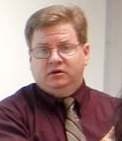
Staying True to Our Roots
Over more than a decade and a half since its beginnings, Shodor has developed into a national leader in combining student experiences, faculty and teacher enhancement; the founding vision however, is still clearly focused on finding a way to design, offer, and fund workshops. Our original plan was "a few workshops each summer in North Carolina," but now most of our work is "on the road."
Just since the last newsletter, Shodor has made presentations and conducted workshops in Athens (yes, Greece!); Melbourne, Australia; Pine Bluff and Little Rock, Arkansas; Berkeley, California; Washington, D.C.; Easton, Pennsylvania; and Las Vegas, Nevada. As you can read in this issue of Interactions, Shodor continues to place great emphasis on these opportunities to better understand the role of interactive computer models and simulations in exploring the world around us. We have a very full Spring and Summer planned!
We like to say that these week-long (or longer) encounters with experts and high quality curricula are called "workshops" because some people come to "work" and some come to "shop"! Shopping for new ways to reach their students, faculty and teachers come to the workshops of the National Computational Science Institute and develop their own content knowledge as they see best practices modeled for them by NCSI staff. At the same time, the materials -drawn from the Computational Science Education Reference Desk and other sources- need to be adapted for their own classroom situations, and so faculty and teachers must undertake some work to customize lessons, models, and datasets for use when they return to campus.
The same is true for our student workshops at Shodor and host sites in RTP and across North Carolina: each modeling topic is introduced to show students how the model can be used to explore the world, and then the students work to adapt the model or build a model of their own. Students move from excitement to experience to expertise as they learn modeling, visualization and programming skills that will serve them well as the 21st century continues to unfold.
With renewed funding from the National Science Foundation and the Supercomputing Conference (SC11) Education Program, augmented by generous funding from the Burroughs Wellcome Fund, we will impact hundreds of teachers, faculty, and students across North Carolina, the nation, and the world.
I hope that you will consider participating yourself or let your colleagues or students know about these opportunities!
All the best,

Bob Panoff
Saturdays at Shodor
BY Michael Valentine, Shodor Intern
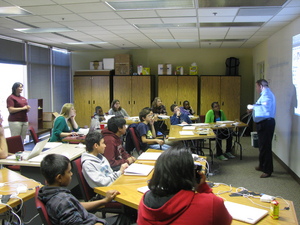
This spring, Saturdays at Shodor are focused on learning through discovery. Shodor is partnering with North Carolina Central University (NCCU) to offer a wide range of topics through Shodor's Saturday Explorations. The Saturday Explorations series consists of 6 weeks of Saturday workshops. Every Saturday students, grades six through eight, have the opportunity to learn about website design, graphics, mathematics, and various science topics. Workshops will alternate in location between NCCU and Shodor.
Recent workshops at NCCU have focused on earth science and chemistry. For example during one workshop, Dr. Garret Love presented a pollution model, using the example of the water cycle through both the air and ground. The students had the opportunity to create a pollution model via Agent Sheets. By using computers, students were able to model air and water movement. Dr Love used dye in an aquarium as a physical model to demonstrate slow water pollution.
Also on Saturdays, the Shodor Apprentices have interactive classes. The first apprentice class this spring focused on Unix commands. This class included a demonstration on layers of Unix system using the analogy of an onion. The instructor, Shodor staff member Jym Williams Zavada, provided a history of computer systems including the physical demonstration of a "dumb" terminal (a display monitor with no processing power, used as an output device to send information to the actual computer). Contests kept things upbeat. Some participants were new to the command line, after being shown the different uses it has, however, many students seemed to have a growing interest in Unix. Apprentices were also introduced to the programming language Python. Students now know how to run basic operations and program using Python. When the students were asked how they enjoy the Apprentice program, one responded with, " I find the classes pretty fun," another said, "I liked the class on terminal."
For more information about Shodor workshops, please visit our calendar.
Students Come in on Snow Days, MLK
BY Ben Ivey, Shodor Intern
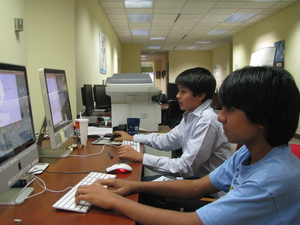
Student involvement (of interns and apprentices) has always been important to Shodor's main mission of computational science education, shown through staff mentorship and dedication. It is not uncommon to see this dedication returned to Shodor through students' voluntary involvement in various projects. During the recent spell of winter weather, and on Martin Luther King Jr. Day this January, students spent their newfound free time working in Shodor's offices in Durham.
"I enjoy working at Shodor because the overall environment is so simple, and allows me to be more productive when I work," apprentice Abu Swaminathan says. "Shodor's staff are all very nice and will drop whatever they're doing in a heartbeat to help you." Students are often eager to return to their work at Shodor, given the strong base of support; this is demonstrated with Abu using his unscheduled time away from school to come to Shodor.
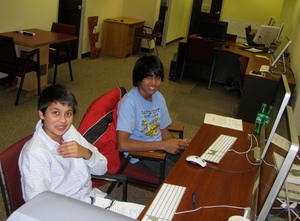
"The office provides a warm, welcoming environment, and I would come here every day if I could," adds Kunal Desai, another student who took advantage of the breaks in school to come into the office.
Many interns and apprentices at Shodor echo these sentiments. Students are always excited about furthering their involvement at Shodor and it shows through their dedication to their work, even with the prospect of an unexpected break from school.
Everyday Functions
BY Patrick Royal, Shodor Intern
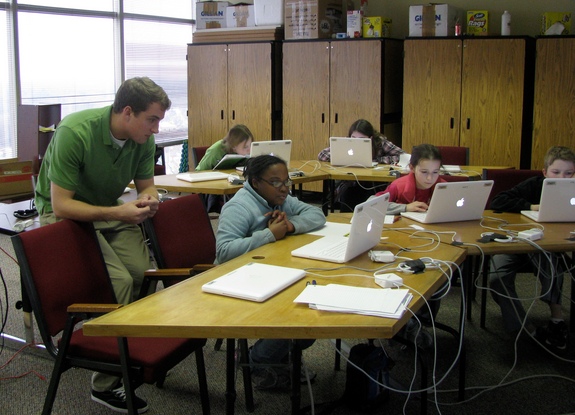
The most common complaint students have about math class is the abstractness of and applicability of the subject matter: "when will I ever use this?", "what does this have to do with the real world?" On January 17, 2011, these questions were answered for 6 students in the Durham area. These students attended a workshop at Shodor where they learned what functions are and how they are useful beyond just passing math class.
Two uses of functions that students learned about were cryptography and tracking epidemics. Cryptography, the science of creating and cracking codes, has roots in ancient times, and one of the first mathematical codes was the Caesar Cipher. This simple code uses modular arithmetic to replace every letter in a certain code with another letter of the alphabet. For instance, "Cross the Rubicon" with a transposition of 3 letters would become "Furvv wkh Uxelfrq". During the workshop, students worked with the Caesar Cipher I and II applets to encode and decode messages via these modular functions. As one workshop student said, "I actually managed to decode the letters A and B whenever the game-thing came out with the letters I and F!"
Students also worked with a concept relevant to the modern world of H1N1 and SARS outbreaks - the Disease Model. This computer simulation allowed students to create a disease, set its qualities (spread, length of time, fatality rate, etc), and then watch it spread or be eradicated in a model population. This helped students to realize that a function doesn't have to be just a simple, mechanical process. Even when students inputted the same settings for their diseases, they would often get different results due to the randomness introduced to these "functions".
More than just learning everyday uses of functions, though, students also learned how to use technology, both to learn about functions and to evaluate complex functions that might be impossible to calculate by hand. Students learned how they could find functions - and model them with computers - in everything from forest fires to population growth. And perhaps most importantly, they learned that math could be a fun and interesting subject to study. In the end, one of the students put it best: "I was most proud that I spent my day at a math camp instead of just sitting around at my house. I had a pretty good time too."
Summer Workshops
BY Krista Katzenmeyer, Shodor Intern
This summer, you could learn how to design a web page, create top-notch graphics, solve mysteries using forensic science or build withstanding towers. Shodor is offering an exciting variety of workshops for Summer 2011. Shodor workshops utilize technology to explore math, science and computer programming topics in great depth. Students work individually and in teams to solve problems, work on projects and develop useful skills with real life applications. The various classes offer a great variety of different topics.
- Programming Concepts allows students the opportunity to explore the basics of computer programming and create their own computer models to simulate the spread of disease and predator/prey relationships.
- Web Design helps students express their creativity while learning and implementing web design basics in order to create their own web pages.
- Explorations in Engineering explores engineering concepts through real-life demonstrations as well as computational simulations.
- Modeling Your World explores the real world applications of many different disciplines including physics, chemistry, biology, mathematics, environmental and biomedical sciences.
- Forensic Science teaches middle school students about different crime solving techniques while also engaging them in hands-on activities to solve a mock mystery.
At the end of the summer, motivated high school students may participate in the Shodor Scholars Program, a two-week program that explores a variety of math, science and computational topics in great depth. For the self- motivated student, Shodor workshops are an excellent summer opportunity. Students in the workshops enjoy the hands-on activities, the interesting subject matter and even the learning! So join us this summer for a morning class, an afternoon class, or perhaps both! Workshops are held at either Shodor or Sigma Xi facilities. Spaces are limited to ensure high quality learning environment.
To apply, visit our workshop calendar.
| Workshop | Grades | Date | Time | Location |
|---|---|---|---|---|
| Explorations in Engineering |
Rising
6th - 8th |
Jun 20 -
Jun 24 |
9AM -
12PM |
Sigma Xi |
| Math Explorations |
Rising
6th - 8th |
Jun 20 -
Jun 24 |
1PM -
4PM |
Sigma Xi |
| Forensic Science |
Rising
6th - 8th |
Jul 18 -
Jul 22 |
9AM -
12PM |
Shodor |
| Modeling Your World |
Rising
6th - 8th |
Jul 18 -
Jul 22 |
1PM -
4PM |
Shodor |
| Programming Concepts |
Rising
6th - 8th |
Jul 25 -
Jul 29 |
9AM -
12PM |
Shodor |
| Web Design |
Rising
6th - 8th |
Jul 25 -
Jul 29 |
1PM -
4PM |
Shodor |
| Programming Concepts |
Rising
9th - 12th |
Jun 20 -
Jun 24 |
9AM -
12PM |
Shodor |
| Web Design |
Rising
9th - 12th |
Jun 20 -
Jun 24 |
1PM -
4PM |
Shodor |
| Explorations in Engineering |
Rising
9th - 12th |
Jul 11 -
Jul 15 |
9AM -
4PM |
Sigma Xi |
| Graphics and Visualization |
Rising
9th - 12th |
Jul 18 -
Jul 22 |
9AM -
4PM |
Shodor |
| Shodor Scholars Program |
Rising
9th - 12th |
Aug 1 -
Aug 12 |
9AM -
4PM |
Shodor |
Shodor Reaches Out to Neighboring Schools
BY Neal Ramesh, Shodor Intern
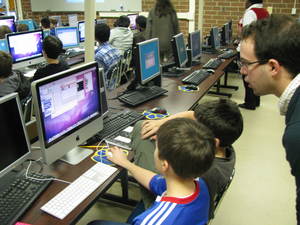
Recently, Shodor has been working to forge a connection with Orange County Schools (OCS). Staff from both institutions met and discussed various possibilities of cooperation, one involving Shodor staff working with OCS students in an afterschool program. Shodor's Executive Director Dr. Robert Panoff stressed that he hopes for Shodor to be able to provide OCS with computational science classes and workshops that will interest students and/or teachers.
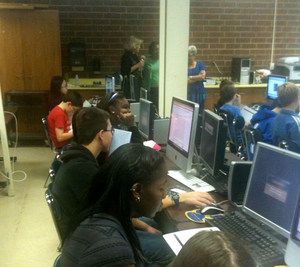
Panoff, along with Shodor staff members Hillary Stoker and Patricia Jacobs, met last semester with Bruce Middleton, the Math and Science Coordinator of OCS, to discuss future plans. Shodor's representatives outlined options for this partnership, enthusiastic to contribute to OCS by teaching lessons on topics chosen by students and teachers. Shodor has been working with other public school systems in the triangle area with the goal of encouraging young students' interests in the fields of math and science. Currently, Shodor works with Durham Public Schools (DPS), to teach workshops and professional development sessions. Several workshops have been well attended, and Shodor plans to continue teaching workshops throughout the area. With new funding from the Burroughs Wellcome Fund Student Science Enrichment Program, Shodor will continue to develop their relationship with OCS, as well as reach out to Carteret, Pamlico, Wilson, Craven, and Onslow counties as part of Shodor's Computing MATTERS program.
Where Are They Now? Michael Woody
BY DeMarcus Hill, Shodor Intern
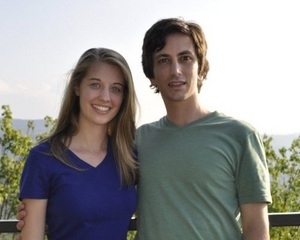
Established in 1994, Shodor has encouraged improvement in math and science through education. Shodor has helped to spread the importance of computational science through hands-on learning, as well as workshops by giving high school and college level students real world experience for future careers. For some former interns, like Michael Woody, Shodor has helped prepare them for other opportunities.
Along with Hanley Rice, his wife and former Shodor intern, Michael Woody currently lives in Bucheon, South Korea where he teaches Space and Earth Science, Physical Science, and Physics to 8th, 9th, and 12th graders respectively at an International School in Bucheon. Bucheon is located just outside of the capital city Seoul. Michael credits Shodor with reinforcing his passion of science and teaching. "Shodor helped me to see the importance and use of computational modeling in both practicing science and teaching it. I use more computer resources in my class than I might have if I had not had my experience at Shodor."
When asked about his favorite memories at Shodor, Michael said, "I really enjoyed the independence and being able to feel like when I had completed part of a project that I could truly be proud of my work because I knew it was my own." Michael would like to thank his former mentors Bob Panoff and Joel Feiner for giving him a great opportunity and also having confidence in him.
Michael leaves this advice for Shodor current students and interns, "Keep working hard, and keep your mind open to any opportunities that present themselves."